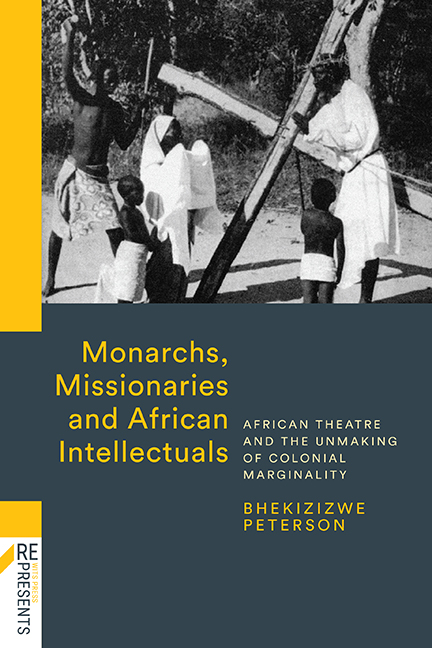 Monarchs, Missionaries and African Intellectuals
Monarchs, Missionaries and African Intellectuals Book contents
- Frontmatter
- Dedication
- Contents
- Preface and Acknowledgements
- Note on Zulu Orthography
- Introduction: Staging the (Alien)nation: African Theatre and the Colonial Experience
- 1 ‘All Work and No Play Makes Civilisation Unattractive to the Masses’: Theatre and Mission Education at Mariannhill
- 2 ‘I Will Open My Mouth in Parables’:Accounting for the Crevices in Redemption
- 3 Parallel Time, Parallel Signs, Discordant Interpretations
- 4 B.W. Vilakazi and the Poetics of the Mental War Zone
- 5 The Bantu Men’s Social Centre: Meeting the Devil on his own Ground
- 6 The Bantu Dramatic Society According to a Gossip Columnist
- 7 Contesting ‘The Bantu Imagination’: The British Drama League & The New Africans
- 8 H.I.E. Dhlomo: Measuring the Distance Between Armageddon and Revolution
- 9 ‘The Black Bulls’: Assembling the Broken Gourds
- 10 Hegemony and Identity: What a Difference ‘Play’ Makes
- Notes
- Bibliography
- Index
4 - B.W. Vilakazi and the Poetics of the Mental War Zone
Published online by Cambridge University Press: 12 October 2021
- Frontmatter
- Dedication
- Contents
- Preface and Acknowledgements
- Note on Zulu Orthography
- Introduction: Staging the (Alien)nation: African Theatre and the Colonial Experience
- 1 ‘All Work and No Play Makes Civilisation Unattractive to the Masses’: Theatre and Mission Education at Mariannhill
- 2 ‘I Will Open My Mouth in Parables’:Accounting for the Crevices in Redemption
- 3 Parallel Time, Parallel Signs, Discordant Interpretations
- 4 B.W. Vilakazi and the Poetics of the Mental War Zone
- 5 The Bantu Men’s Social Centre: Meeting the Devil on his own Ground
- 6 The Bantu Dramatic Society According to a Gossip Columnist
- 7 Contesting ‘The Bantu Imagination’: The British Drama League & The New Africans
- 8 H.I.E. Dhlomo: Measuring the Distance Between Armageddon and Revolution
- 9 ‘The Black Bulls’: Assembling the Broken Gourds
- 10 Hegemony and Identity: What a Difference ‘Play’ Makes
- Notes
- Bibliography
- Index
Summary
This chapter discusses the intertextuality at the centre of B.W. Vilakazi's poetry. Vilakazi, a past student and teacher at Mariannhill, is regarded as the premier poet in Zulu literature and a scholar and artist of considerable stature in the annals of black South African literature. Vilakazi's poetry provides a useful body of work in which to examine his detailed ideological riposte to the tenets of evangelism and colonialism as presented in previous chapters. The intriguing aspect about the intertextuality symptomatic of Vilakazi's writing is its encapsulation of the poetics of the crossroads, that treacherous gateway where diverse and diffuse variables and influences coalesce to form enigmatic texts and subject positionalities. The myriad constitutive experiences that shaped Vilakazi's identity – starting with his childhood in the kholwa community of Groutville, his education, conversion to Catholicism and employment at Mariannhill, and his interactions with the African intelligentsia in Durban and Johannesburg – were not passively received and reflected. He remarshalled and rearticulated them to express his own deepfelt social convictions and personal aspirations. In the process he created a body of work, nationalistic in intent that, in spite of its contradictions and ambiguities, went far beyond the imperatives of mimicry.
BORN AT THE RITE TIME: DISSECTING THE CROSSROADS OF HISTORY
Vilakazi was born on 6 January 1906, the sixth child of Mshini kaMakhwatha and Leah Hlongwane kaMnyazi. Vilakazi was named Bambatha Wallet Vilakazi in recognition of the tumultuous revolt that occurred in that year. Vilakazi's parents were kholwa and his father was a sugar farmer in Groutville, near Stanger, Natal. Groutville was a Protestant mission station on the banks of the Mvoti River. It was named after Aldin Grout but it was also known as Umvoti Mission Reserve. Vilakazi started his education at the Groutville School in 1912. The community at Groutville during this period has been described by its most famous family, Albert John and Nokukhanya Luthuli. Chief Luthuli, Nobel Peace Prize winner, returned to Groutville from Rhodesia around 1908/9 where he found ‘a mixed community of heathens and Christians, of relatively well-educated people, and people with no literacy at all’. The African middle classes in the inter-war years are often dismissed as acculturated ‘black Englishmen’, alienated from African culture and the political imperatives of Africans.
- Type
- Chapter
- Information
- Monarchs, Missionaries and African IntellectualsAfrican Theatre and the Unmaking of Colonial Marginality, pp. 91 - 118Publisher: Wits University PressPrint publication year: 2021


